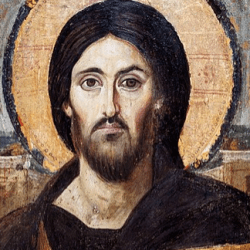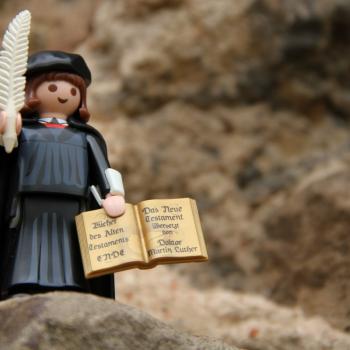A few people have pointed me to a post in which it is argued that the early Lutherans did not believe in the two kingdom distinction, but were in fact Theonomists. The article can be found here. For those readers who are unfamiliar with the Theonomy movement, it is a contemporary movement which began in the 1960s-1970s with Rousas Rushdoony who argued that Old Testament civil laws should be applied in the state today. In contrast to this, Lutherans have traditionally argued that the state is governed by natural law.
The post claims:
While Lutheranism has a reputation for promoting a “two kingdoms” theology which says that Scripture—especially the judicial law of Moses—does not inform the civil realm, this was not necessarily the case, at least in regards to early Lutheranism.
I’m not sure if the author has spent much time reading Luther, or any Luther scholarship. Even the most cursory glance at his writings demonstrates that it is Luther who in fact came up with the “two kingdoms” distinction. This is discussed by Luther in nearly every writing of his that deals with political issues, and is a common theme in his sermons. Luther, for example, argues that God’s kingdom (the kingdom of the right) is “a spiritual kingdom, a kingdom of grace and mercy, a kingdom of forgiveness of sins, and of eternal life” (Complete Sermons of Martin Luther 6:251). Luther does not argue that the state or culture are in any sense “the kingdom of God,” as Theonomists purport. Here’s another example of Luther explicitly differentiating this from the earthly kingdom:
There are two kingdoms, one earthly, the other heavenly, and they must be carefully distinguished. In the earthly, or temporal, kingdom tables re set, and people eat, drink, and sleep, ministering to their physical necessities…But in the kingdom of heaven the banquet and the food are altogether different: Here the master of the house and banquet host in the heavenly Father, Creator and Lord of heaven and earth. (Complete Sermons of Martin Luther 6:242)
The two kingdoms are not, for Luther, the church and the state, but the spiritual and earthly realms. The kingdom of God specifically relates to man’s relation to God, and his justification and eternal life. The kingdom of the left is all earthly matters, which includes (but is not limited to) civil government. If you question such a distinction in Luther, I would urge you to read any Luther scholarship on this issue. I recommend Heinrich Bornkamm’s little booklet on Luther’s two kingdom distinction or Paul Althaus’ The Ethics of Martin Luther.
The post continues by contending that many early Lutherans argued that the first table of the law has some applicability in the civil realm, and thus promote a Theonomic, rather than two kingdom, stance. The contention that Luther argued that the state can at times suppress heresy is correct. Though the church and the state differed in purpose for Luther, he defended the notion that the state was to allow for and promote the spreading of the gospel. People can never be coerced into believing, but the government can ban outward heresy in the public sphere. This is something that is recognized by nearly everyone who has done scholarship on Luther’s view of the two kingdoms. I would point you, for example, to Althaus’ chapter on the subject mentioned above. He deals extensively with the relationship between religious liberty and the suppression of outward heresy in Luther’s thought. The statement that “This is far from two kingdoms theology, and is in fact thoroughly theonomic.” Is a total misunderstanding of two kingdom theology.
The author of this article quotes several places in Luther, Melanchthon, and others, where it is argued that heresy and witchcraft should be punished by the state. This actually doesn’t really prove anything regarding Theonomy. To demonstrate that the early Lutherans were in any sense Theonomists, one would have to show, not only that they thought the first table of the law had any relevance to the state, but that when implementing the first table, the state was called to use the Old Testament civil law as a guide. None of the citations in this article do that.
There is one citation which I find particularly interesting which is from Melanchthon or Brenz:
God has clearly and explicitly ordered the civil authority to punish by death the public blasphemers within its territory (Lev. xxiv.16). This law did not only bind Israel; it is a natural law which binds all authorities, kings, princes, judges etc.[19]
I’m not sure if the author of this post read this citation carefully, but in it, natural law and the laws that “only bind Israel,” are distinguished. The punishment of public blasphemers is not to be taken directly from the Mosaic code, but is valid because it is part of natural law. Luther would certainly agree that parts of the Mosaic judicial law were a reflection of natural law, but magistrates are not required to obey them because they are Mosaic. Rather, they are required to enforce them because they are in accord with natural law.
This post fails to make any case that Lutherans were Theonomic. Yes, the early Lutherans thought that the state should punish blasphemers, but they were also thoroughly entrenched in two kingdom/natural law theology. The question about the wisdom of punishing blasphemers is another question altogether, but whatever one’s position on the issue, that does not make one a Theonomist.












